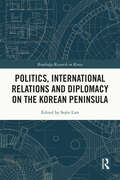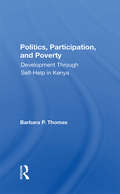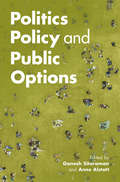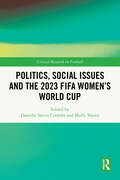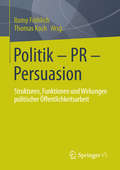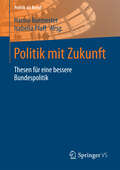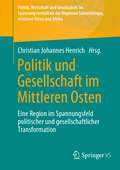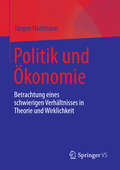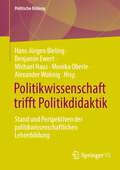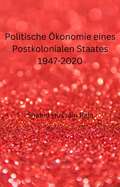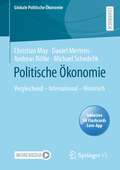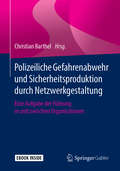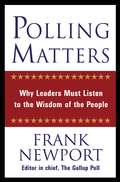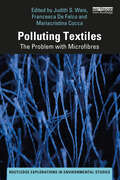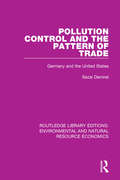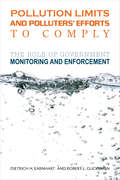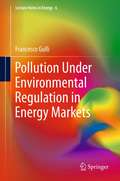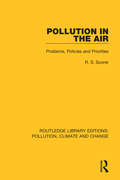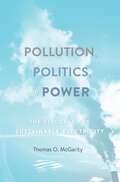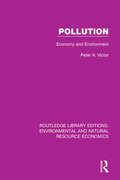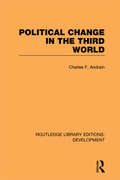- Table View
- List View
Politics, International Relations and Diplomacy on the Korean Peninsula (Routledge Research on Korea)
by Sojin LimThis edited volume explores the past, present, and future of the Korean Peninsula, with special focus on South Korea, by connecting developments in politics with those in international relations and diplomacy. The book focuses on how South Korea’s politics and international relations have evolved since the founding of the First Republic in 1948, with particular attention to the period surrounding the 2022 presidential election. The authors provide new insights into Korean politics, including South Korean electoral reform and relations with China and Japan, North Korea’s nuclear capacity, and North–South diplomacy. Beginning with a commentary by Colin Crooks, Britain’s current Ambassador to South Korea and former Ambassador to North Korea, on recent British foreign policy changes and UK–Korea relations, this book will appeal to scholars and students of politics, international relations, diplomacy, and Korean Studies.
Politics, Participation, And Poverty: Development Through Self-help In Kenya
by Barbara Thomas-Slayter Barbara P. ThomasFocusing on the distribution of benefits in relation to class, ethnicity, and gender, this book explores the methods to which the rural poor can organize themselves to participate in economic and social development and examines the roles that self-help organizations play in the political economy of Kenya. Dr. Thomas looks at the competition for pow
Politics, Policy, and Public Options
by Anne Alstott Ganesh SitaramanA public option is a government-provided social good that exists alongside a similar privately provided good. While the public option is typically identified with health care policy, public options have been a longstanding feature of American life in a variety of sectors, ranging from libraries to swimming pools. Public schools, for example, coexist alongside private schools. However, there is surprisingly little research on 'public options' as a general category. Rather, over the last few decades, considerable scholarly and popular efforts to ensure access to important social goods have focused on market subsidies (like vouchers) or privatization – which both face increasing criticism. Uniting scholars from across disciplines, this volume delves into the theory of the public option, explores several important case studies, and shows how public options could be a corrective to the trend toward privatization and subsidies. This title is also available as Open Access on Cambridge Core.
Politics, Social Issues and the 2023 FIFA Women’s World Cup (Critical Research in Football)
by Danielle Sarver Coombs Molly YanityThis book takes a close look at politics and social issues in the context of the 2023 FIFA Women’s World Cup, one of the most attended women’s sporting events in history. Featuring the work of leading researchers from around the world, the book is arranged into two thematic sections, with the first examining power structures and inequalities and the second exploring nationalism, identities, and experiencing the women’s game. The book presents a series of important and fascinating cases - including campaigns for equal pay for players; governance, ethics and women’s rights in Spanish football; the legacies of the Australian Matildas; and the impact of fan spaces – that together form a multi-layered picture of a signature event in the history of women’s sport. This book is vital reading for anybody with an interest in women’s sport, gender and sport, the sociology of sport, the politics of sport, event studies or sport business and management.
Politics: Winner Takes All--What Politics Can Learn From Marketing
by John A. Quelch Katherine A. JoczIn the political marketplace of the United States, compared with the consumer marketplace, choice is limited and information is simultaneously overwhelming and inadequate. Borrowing more ideas and capabilities from marketing could be just what is needed to make American and other representative democracies more democratic. Political parties can learn from mass marketers how to both accommodate diversity in constituents' interests and desires, and to create a common umbrella that unifies and motivates constituents.
Politik - PR - Persuasion
by Romy Fröhlich Thomas KochEin Thema steht auch in wahlkampffreien Phasen immer wieder gerne im Fokus der Medien: Das Verhältnis zwischen Politik und Public Relations. Die Bandbreite reicht von kritischen Berichten über vermeintlich unethische bis illegale Verquickungen zwischen beiden, über die Kritik an der Tatsache, dass die Politik öffentliche Gelder für Kommunikationsdienstleister ausgibt oder über den Einfluss kollektiver und individueller Interessensvertreter auf politische Entscheidungsprozesse (z. B. Stuttgart 21) bis hin zur zuweilen stark skandalisierenden Berichterstattung über Aufträge an PR-Agenturen, bestimmte Spitzenpolitiker wirksam zu inszenieren. Der massenmedialen Aufmerksamkeit im Umgang mit diesem Thema steht die Tatsache gegenüber, dass die wissenschaftliche Auseinandersetzung damit im deutschsprachigen Raum noch eher ein stiefmütterliches Dasein fristet. Mit diesen Beiträgen werden die übergreifende Bandbreite und die Foci relevanter nationaler und internationaler Forschung und Literatur zum Thema gebündelt und zugänglich gemacht (,,mapping"). So kann das Buch für Wissenschaftler aber auch für Studierende, die sich mit dem Thema "Politik und Public Relations" beschäftigen, zu einer Art "key point of reference" für aktuellste und bisherige Forschung zum Thema werden
Politik mit Zukunft: Thesen für eine bessere Bundespolitik
by Hanno Burmester Isabella PfaffDie deutsche Politik zerreibt sich im Spagat zwischen zunehmend protestbereiten Wählern vor Ort und der Anforderung, hyperkomplexe Probleme auf europäischer und globaler Ebene lösen zu müssen. Dadurch erodiert das Ansehen von Politik und Parteien - eine Bewegung, die letztlich demokratiegefährdend ist. Die in der Nachkriegszeit ausgeprägten Mitwirkungs- und Entscheidungsmechanismen der Bundesrepublik werden zunehmend in Frage gestellt; sie scheinen den Wählerbedürfnissen und Herausforderungen des 21. Jahrhunderts nicht mehr gerecht zu werden. Das Ergebnis: die Politik wird abgehängt. Dieses Buch ist ein leidenschaftliches Plädoyer für gute Politik - und die Voraussetzungen, die man für ihre Renaissance schaffen muss. In dreizehn streitbaren Thesen benennen Kenner des politischen Berlins offen die Schwächen des bundespolitischen Betriebs und zeigen, was sich ändern muss, um den Ansehensverlust der Politik zu stoppen. Dabei richtet sich der Blick nicht nur auf Politiker selbst, sondern auch auf die anderen Steuermänner des "Raumschiffs Berlin": Journalisten, Beamte, Berater und Mitarbeiter.
Politik und Gesellschaft im Mittleren Osten: Eine Region im Spannungsfeld politischer und gesellschaftlicher Transformation (Politik, Wirtschaft und Gesellschaft im Spannungsverhältnis der Regionen Südosteuropa und Mittlerer Osten)
by Christian Johannes HenrichIn diesem Sammelband werden die historischen, politischen und gesellschaftlichen Facetten der politischen Systeme der einzelnen Länder des Mittleren Ostens analysiert. Auch die Transformationsprozesse in den Gesellschaften im Kontext des Arabischen Frühlings, des Krieges in Syrien, des Bürgerkriegs in Libyen oder des Putsches in Ägypten spielen eine zentrale Rolle. Ebenfalls wird Israel beleuchtet, das als unvollständige Demokratie der einzige Hoffnungsschimmer im Umfeld zahlreicher autoritärer und totalitärer Systeme ist. Die Region ist zudem aufgrund der energiepolitischen Abhängigkeit sehr wichtig für die Europäische Union.
Politik und Ökonomie
by Jürgen HartmannPolitik und Ökonomie sind unauflösbar miteinander verknüpft. In der Wissenschaft sind sie einander fremd. Dieses Buch schildert die wichtigsten Stränge der für die Gegenwart bedeutsamen Wirtschaftstheorien und das Verhältnis der Politikwissenschaft zur Wirtschaftspolitik. Weitere Kapitel schildern die Bedeutung der Ideologien, der Notenbanken, der Regierungen und der Finanzmärkte an den Beispielen der USA, Deutschlands, Japans und der Eurozone. Dabei werden unter anderem die Ursachen und Folgen der großen Finanzkrise von 2008, die Eurokrise und das Problem der schuldenfinanzierten Staatshaushalte erörtert.
Politikwissenschaft trifft Politikdidaktik: Stand und Perspektiven der politikwissenschaftlichen Lehrerbildung (Politische Bildung)
by Michael Haus Monika Oberle Alexander Wohnig Benjamin Ewert Hans-Jürgen BielingVor dem Hintergrund bildungspolitischer und gesellschaftlicher Veränderungen untersucht der Sammelband Stand und Perspektiven der politikwissenschaftlichen Lehrerbildung in zentralen Themenfeldern in Deutschland. Ziel ist es, die Relevanz der Lehrerbildung in der Politikwissenschaft in die gesamte Disziplin hinein zu verdeutlichen, einen vertieften Austausch zwischen Fachwissenschaft und Fachdidaktik zu befördern und Wege zur zukünftigen Aufstellung des Faches im Bereich der Lehrerbildung aufzuzeigen.
Politische Ökonomie eines Postkolonialen Staates 1947-2020: Eine kurze Geschichte
by Shahid Hussain RajaIn diesem Buch wird versucht, die Entwicklungserfahrungen eines postkolonialen Staates vor dem Hintergrund sich ständig verändernder Wachstumsvorstellungen zu erklären. Pakistan war ein typischer unterentwickelter Staat, als es am 14. August 1947 als Ergebnis der Auflösung des Britisch-Indischen Reiches seine Reise als unabhängiger Nationalstaat antrat. Es stand vor fast den gleichen unzähligen Herausforderungen, mit denen jeder postkoloniale Staat zu jener Zeit zu kämpfen hatte. Der neue Staat nahm diese Herausforderungen mutig an und begann seine Reise buchstäblich bei Null. Trotz all dieser Höhen und Tiefen ist Pakistan heute, gemessen an der Kaufkraftparität (KKP), die 26. größte Volkswirtschaft der Welt (44. größte, gemessen am nominalen BIP). Mit einem Pro-Kopf-Einkommen von 4550 US-Dollar liegt Pakistan dank seiner wachsenden Bevölkerung von mehr als 200 Millionen Menschen auf Platz 140 in der Welt. Pakistan gehört zu den "Next Eleven", den elf Ländern, die zusammen mit den BRIC-Staaten das Potenzial haben, sich im 21. Übersetzt mit www.DeepL.com/Translator (kostenlose Version)
Politische Ökonomie: Vergleichend - International - Historisch (Globale Politische Ökonomie)
by Andreas Nölke Christian May Daniel Mertens Michael SchedelikDieses Lehrbuch liefert eine Einführung in das Feld der Politischen Ökonomie. Es verbindet die Perspektiven der Vergleichenden Politischen Ökonomie, der Internationalen Politischen Ökonomie und der Historischen Politischen Ökonomie zu einer umfassenden Darstellung. Auf Karl Polanyi aufbauend beleuchtet es, wie der Kapitalismus unterschiedliche Spielarten annimmt, wie seine Organisationsprobleme national wie auch international bearbeitet werden und wie er sich in einer Wellenbewegung fortentwickelt. Durch seine kritisch-institutionalistische Herangehensweise hilft das Buch, die Dynamiken des Kapitalismus in den letzten 100 Jahren und gegenwärtige Problemfelder im Bereich Politik und Wirtschaft zu erklären und zu verstehen. Für Lehrende steht online ein Satz Folien mit allen Abbildungen und Tabellen zur Nutzung in Lehrveranstaltungen bereit.Zusätzliche Fragen per App: Laden Sie die Springer Nature Flashcards-App kostenlos herunter und nutzen Sie exklusives Zusatzmaterial, um Ihr Wissen zu prüfen.
Polizei als lernende Organisation: Systemisches Polizeimanagement in Planungspraxis, Entscheidungsfindung und Handlungsoptionen
by Jan-Philipp KüppersIst das Polizeimanagement lernfähig? Wie äußert sich das in seinem strategischen und operativen Handlungsumfeld? Und: Welchen Einfluss haben institutionell gewachsene Automatismen darauf? Die Polizei als flexible und adaptive Einsatzorganisation ist mit komplexen dynamischen Handlungsfeldern, Risiken und Gefährdungspotenzialen konfrontiert. Neben der täglichen Routinearbeit kommen Demonstrationen, Amokläufe, terroristische Anschläge hinzu. Die Polizei als lernende Organisation sollte daher stets auf unerwartete Ereignisse und sicherheitsrelevante Entwicklungen vorbereitet sein, um sie frühzeitig zu erkennen und folgenarm zu bewältigen. Anhand von drei praktischen Fallbeispielen wird untersucht, ob und wie operative Polizeieinsätze systemorientiert nach Kriterien der lernenden Organisation ablaufen können und wo Verbesserungspotenziale für unerwartete und kritische Situationen möglich oder notwendig sind.
Polizeiliche Gefahrenabwehr und Sicherheitsproduktion durch Netzwerkgestaltung: Eine Aufgabe Der Führung In Und Zwischen Organisationen
by Christian BarthelAlle Organisationen im Politikfeld Innere Sicherheit – Polizei, Feuerwehr, Rettungsdienste sowie Organisationen der öffentlichen Verwaltung mit sicherheitsrelevanten Aufgaben – sehen sich heute vor die Herausforderung gestellt, Sicherheit in Kooperation mit anderen Akteuren zu gewährleisten. Die aktuelle Bedrohungslage durch Terror, die Verletzlichkeit zentraler öffentlicher Infrastrukturen und des gesellschaftlichen Zusammenlebens bedarf einer systematischen Netzwerkorientierung der Sicherheitsakteure, die traditionelle Formen der Zuständigkeitsorientierung und des Nebeneinanderagierens der Sicherheitsakteure verabschiedet.Das Herausgeberwerk betrachtet die Perspektive der konkreten Netzwerkarbeit im Spannungsfeld zwischen (interorganisationalen) Einfluss- und Machtbestrebungen einerseits und professioneller Handlungsfähigkeit der Akteure andererseits und beleuchtet, wie die Rückwirkungen auf die jeweiligen Organisationen sich im Sinne des „institutional learning“ darstellen. Dabei steht die Rolle der Führungskräfte auf der mittleren Managementebene insbesondere der Polizei im Fokus der Beiträge. Die Autoren gehen u. a. auf folgende Fragen ein: Wie initiieren und managen Führungskräfte Kooperationen in der regionalen Sicherheitsproduktion? Welche professionellen Kompetenzen sind hierzu notwendig? Welche Angebote seitens polizeilicher Führungs- und Managementkonzepte sind für diese Fragestellung von Nutzen?
Polling Matters: Why Leaders Must Listen to the Wisdom of the People
by Frank NewportIntegrating lessons from history and social science in a conversational style, Newport, editor in chief of The Gallup Poll, the country's preeminent polling source, explains how polling works and why polls matter in this book for general readers and students. He advocates polls as the best mechanism for drawing on the collective wisdom of Americans from all walks of life.
Polluting Textiles: The Problem with Microfibres (Routledge Explorations in Environmental Studies)
by Judith S. Weis Mariacristina Cocca Francesca De FalcoThis book examines the critical issue of environmental pollutants produced by the textiles industry. Comprised of contributions from environmental scientists and materials and textiles scientists, this edited volume addresses the environmental impact of microplastics, with a particular focus on microfibres released by textiles into marine and water environments. The chapters in Part I offer environmental perspectives focusing on the measurement of microplastics in the environment, their ingestion by small plankton and larger filter feeders, the effects of consuming microplastics, and the role of microplastics as a vector for transferring toxic contaminants in food webs. Written by environmental and material scientists, the chapters in Part II present potential solutions to the problem of microplastics released from textiles, discussing parameters of influence, water treatment, degradation in marine environment, textile end-of-life management, textile manufacturing and laundry, possible policy measures. This is a much needed volume which brings together in one place environmental research with technical solutions in order to provide a cohesive and practical approach to mitigating and preventing environmental pollution from the textiles industry going forward. This book will be of great interest to students and scholars of environmental conservation and management, environmental pollution and environmental chemistry and toxicology, sustainability, as well as students and scholars of material and textiles science, textile engineering and sustainable manufacturing.
Pollution Control and the Pattern of Trade: Germany and the United States (Routledge Library Editions: Environmental and Natural Resource Economics)
by Sezai DemiralThis title, first published in 1990, is intended to assess the impact of national environmental control policies on international trade and competitiveness in general, and, in particular, the impact of differential environmental control policies on the international trade and competiveness of the two industrialized nations, Germany and the United States. To assess the impact of differential environmental control policies on trade, this study applies a comparative analysis of the two countries.
Pollution Limits and Polluters’ Efforts to Comply: The Role of Government Monitoring and Enforcement
by Dietrich H. Earnhart Robert L. GlicksmanThis book integrates the fields of economics and law to empirically examine compliance with regulatory obligations under the Clean Water Act (CWA). It examines four dimensions of federal water pollution control policy in the United States: limits imposed on industrial facilities' pollution discharges; facilities' efforts to comply with pollution limits, identified as "environmental behavior"; facilities' success at controlling their discharges to comply with pollution limits, identified as "environmental performance"; and regulators' efforts to induce compliance via inspections and enforcement actions, identified as "government interventions." The authors gather and analyze data on environmental performance and government interventions from Environmental Protection Agency (EPA) databases, and data on environmental behavior gathered from their own survey of all 1,612 chemical manufacturing facilities permitted to discharge wastewater in 2002. By analyzing links between critical elements in the puzzle of enforcement of and compliance with environmental protection laws, the text speaks to several important, policy-relevant research questions: Do government interventions help induce better environmental behavior and/or better environmental performance? Do tighter pollution limits improve environmental behavior and/or performance? And, does better environmental behavior lead to better environmental performance?
Pollution Under Environmental Regulation in Energy Markets
by Francesco GullìPollution Under Environmental Regulation in Energy Markets provides a study of environmental regulation when energy markets are imperfectly competitive. This theoretical treatment focuses on three relevant cases of energy markets. First, the residential space heating sector where hybrid regulation such as taxation and emissions trading together are possible. Second, the electricity market where transactions are organized in the form of multi-period auctions. Third, namely natural gas (input) and electricity (output) markets where there is combined imperfect competition in vertical related energy markets. The development of free or low carbon technologies supported by energy policies, aiming at increasing security of supply, is also explored whilst considering competition policies that reduce market power in energy markets thus improving market efficiency. Pollution Under Environmental Regulation in Energy Markets discusses the key issues of whether imperfect competition can lessen the ability of environmental policy to reduce pollution and/or to minimize the cost of meeting environmental targets. Policymakers, analysts and researchers gain a thorough understanding of the performance of environmental policy from Pollution Under Environmental Regulation in Energy Markets leading to better design of simulation models of performance and costs of environmental regulation.
Pollution in the Air: Problems, Policies and Priorities
by R. S. ScorerOriginally published in 1973, this book has enduring relevance in the 21st Century. Asking difficult questions it encourages the reader to think about the individual and societal changes which are needed to protect the planet and the health and prosperity of future generations. Despite the title of the book, it covers air, water and land pollution, evolution, the industrial revolution, the growth of technology, climatology and meteorology, pollution legislation and the economics of a green economy.
Pollution, Politics, and Power: The Struggle for Sustainable Electricity
by Thomas O. McGarityToday’s electric power companies compete to provide cleaner electricity. That’s a good thing, but progress has come with costs, especially for communities reliant on the coal industry. Thomas McGarity examines the changes of recent decades and offers ideas for building a more sustainable grid while easing the economic downsides of coal’s demise.
Pollution: Economy and Environment (Routledge Library Editions: Environmental and Natural Resource Economics)
by Peter A. VictorThis study, originally published in 1972, examines the connections between human society and the rest of the universe that are attributable to economic activity. These include the inputs from the environment to industry, such as oxygen, used in the combustion of mineral fuels. Also included are the industrial outputs which are fed back into the environment in the form of waste products. An attempt will be made to establish functional relations between the extent and character of economic activity and the flow of materials in both directions between the economy and the environment. This title will be of interest to students of environmental and natural resource economics.
Poltiical Change in the Third World (Routledge Library Editions: Development)
by Charles AndrainIn this informative and highly readable book, first published in 1988, Charles Andrain explores the ways in which public policies and socio-political beliefs and structures cause political change in the Third World. The author examines 3 types of political change: (1) transitions in political leaders and their policies, (2) fundamental transformations in political structures, policy priorities, and political strategies for dealing with policy issues; and (3) the impact of economic, education, and health care policies on the society itself (including changes in unemployment, inflation, economic growth, literacy and birth and death rates). In the first part of the book, Professor Andrain presents a general overview of political change in the Third World, explaining how different models of political systems explain the dynamics of political events in Latin America, Asia, Africa and the Middle East. In the second part of the book, he then applies these models to specific changes in five developing nations: Vietnam, Cuba, Chile, Nigeria and Iran. The book is unique in its careful blending of a policy focus with a structural analysis of nation states, domestic social groups, and international institutions in the often turbulent regions of the developing world. It thus provides a very useful systematic approach to political developments in the Third World that will be welcomed by students, faculty and general readers.
PolyMedica Corp. (A)
by Jacob Cohen David F. HawkinsThe Securities and Exchange Commission and investors question PolyMedica Corp.'s practice of capitalizing rather than expensing of direct-response advertising.
